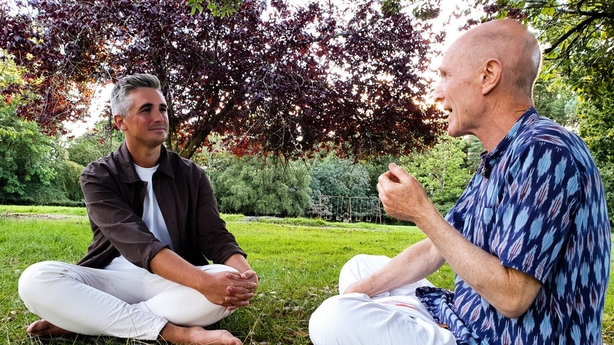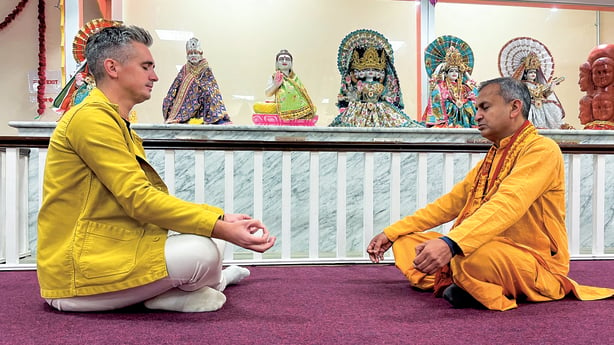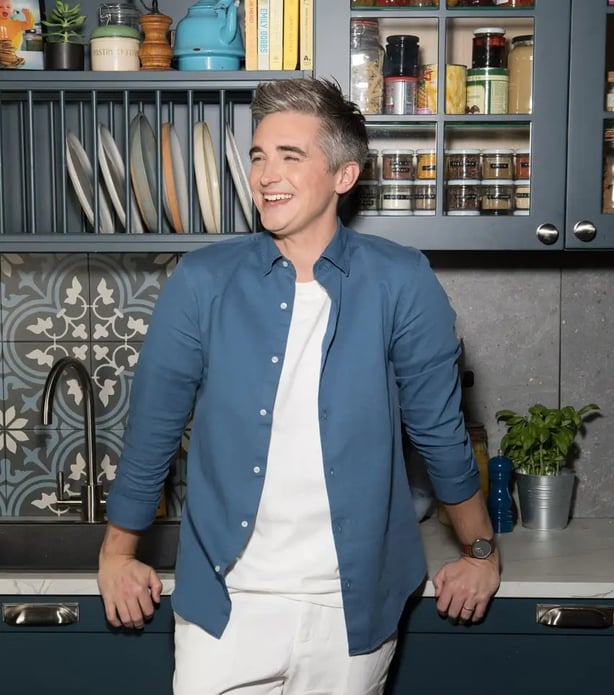When Donal Skehan lived in Los Angeles with wife Sofie, before the pandemic and the profound upheaval it would cause him and so many others across the world, he became attuned to the hubs of community in the sprawling city, deeply aware of missing his own network back home in Dublin.
"I remember in our neighbourhood there was a Christian Assembly and there was that sense of communities coming together", the cook and presenter tells me. He remembered watching the families gather "and going home, just the two of us and kind of going, oh, jeez, this is when we normally would have had our Sunday roast with the family and all that".

"I think anyone who moves away from home feels that kind of slight bit of loneliness when you come to a country for the first time." No wonder, then, he – like many others – started looking for connection and community.
In his new two-part documentary Donal's Feasts, Fasts and Festivals – part two of which airs tonight – Donal pursues culinary enlightenment by spending time with Ireland's Hindu, Jewish, Orthodox Christian, Sikh, Muslim and Hare Krishna communities, learning what connects them by delving into the foods they serve, and avoid.
He said that he was inspired to take on this challenge by his own "need and urgency for spirituality", something he said came on him in the wake of the couple welcoming their two sons, Noah (5) and Oliver (3).
"You feel a little lost as a new parent and someone who's living abroad so finding that kind of connection through religion was something I was interested in, certainly not to the point where I was going to convert to a new religion, but to the point where I was intrigued by the element of religious connection and spirituality.
"I didn't convert to Scientology or anything like that, I had my awareness heightened, I suppose, in LA", he joked.
Rituals around food is a key part of Donal's family life, starting from when he was a child when every Sunday would be marked by a roast chicken dinner, with everyone sitting down together.
"It sounds simple, but it is one thing that was consistent. My parents worked throughout the week, so we always had very busy family kind of weekdays, but [on] Sunday, while we might not have been up getting mass, we were certainly guaranteed that chicken was on the table and that we were all going to sit down and have conversations and connect with each other."
It's a tradition he strives to continue with his own family, especially after the tumultuous few years they've had: "From our perspective, after a fairly incredibly busy couple of years, it is that moment where there is a stop and there is a moment to kind of have appreciation for what's gone on and have appreciation and gratitude for everything that you've kind of experienced."
From fasting with Muslims for a day during Ramadan, to helping to prepare the family meal for Passover, Donal got an intimate glimpse into how each of the six religious communities he spent time with use food as a way of bonding, as well as passing on values and beliefs.

"Certainly with the Hindu community, the Hare Krishna community, it was that element of you're eating things because they are a positive, uplifting experience", he said. "And as you try and kind of weave that into your daily life, you are making better choices with your food. Because food has purpose and I think it is a good reminder for anyone."
Even his fast, small in comparison to the typical 30-day fast, challenged his own initial perceptions of what that must be like.
"I think everyone has preconceived ideas on what fasting is and I think I went into it thinking, oh, God, this is awful, or, this is a negative, in the sense that you're going to miss out on food, you're going to be starving.
"And any Muslim I spoke to felt that it was a great honour and it was a moment where they really connect to their faith. So it was never seen as a negative in the way that I think irish people might think of.

"Most people I spoke to would speak about it being a lovely moment to connect with their faith. And most people during Ramadan who I spoke to were very much saying it was sad when it came to an end because it was a lovely moment where they connected with their faith, they connected with their family, and friends."
As for his highlights from cooking with the communities, Donal said the simple and ancient act of making bread stood out the most.
"Speaker 1 (08:21)I thought that was a lovely thing that kind of was quite simple and quite representative of communities coming together and doing something that everyone enjoys. And in the Jewish community, that was challah and that lovely sense of weaving the bread dough.
"We were all part of the community."
Part 2 of Donal's Feasts, Fasts and Festivals airs on Thursday at 10.15pm on RTÉ One.







